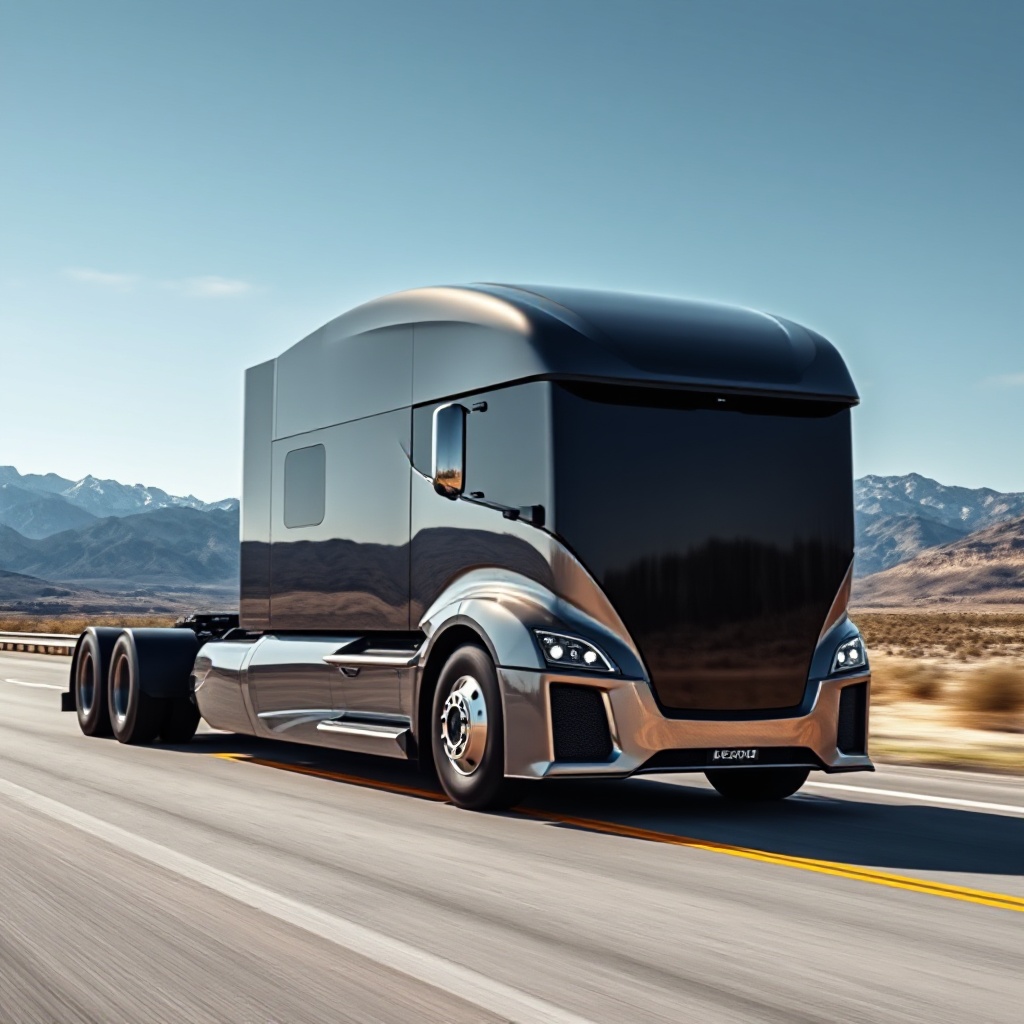Windrose Technology launches America's first commercial electric sleeper truck, the R700, with 445-mile range and ultra-fast charging—beating competitors to market with proven performance.

Drivetech Partners
Windrose Technology has shattered barriers in the freight industry with the launch of America's first commercially available all-electric long-haul sleeper truck, the R700. This groundbreaking vehicle not only delivers impressive performance metrics with a 445-mile range and 818 kW fast-charging capability but enters the market as a fully operational solution while competitors like Tesla continue to delay their Semi production.
Key Takeaways
Windrose's R700 is America's first electric sleeper truck ready for commercial freight operations today
The truck boasts a 445-mile range at 37.2t GVW with industry-leading 818 kW charging capability
Strategic partnerships with JoyRide Logistics and EO Charging create a complete ecosystem for fleet operators
Real-world validation includes cross-country journeys of over 2,800 miles using existing charging infrastructure
Domestic manufacturing in Georgia will begin in 2025, targeting total cost of ownership parity with conventional trucks

Engineering Excellence: Inside the R700's Revolutionary Design
The Windrose R700 represents a significant engineering achievement in the electric trucking space. Its impressive 445-mile range at 37.2t gross vehicle weight (GVW) addresses one of the most persistent concerns about electric trucks - range anxiety. For European operations, the truck maintains a respectable 416-mile range even at a higher 44t GVW.
At the heart of this performance lies a substantial 729 kWh battery system that cleverly combines both LFP and NMC battery technologies to optimize performance, cost, and longevity. The truck runs on an 800V high-voltage platform architecture, enabling exceptional efficiency and faster charging.
Aerodynamics play a crucial role in maximizing range, with the R700 boasting an exceptional 0.2755 drag coefficient. This streamlined design helps extend range while the truck's four motors deliver an impressive 1,045-1,400 hp. Despite housing substantial battery capacity, the weight-optimized design maintains a competitive 11.9-ton curb weight.
The R700's charging capabilities are equally remarkable, supporting up to 818 kW maximum charging power. This dual-inlet charging system is compatible with both Megawatt Charging System (MCS) and Combined Charging System (CCS) standards, ensuring flexibility across charging networks.
Proven Performance Through Real-World Testing
Unlike some competitors who rely on theoretical capabilities, Windrose has validated the R700 through extensive real-world testing. The truck has already completed a 2,800-mile cross-country journey across the United States using only publicly available charging stations - a significant milestone for electric long-haul transportation.
International testing has been equally impressive, with the R700 successfully delivering cargo on a 3,000+ mile trip from Hong Kong to the Kazakhstan border. This remarkable journey demonstrated the truck's reliability in diverse conditions and terrains.
Further validation is planned with an upcoming test run from New York to Savannah, Georgia in the coming months. These real-world demonstrations provide compelling evidence that electric trucks can handle the demanding requirements of long-haul freight operations.
Regulatory compliance has also been addressed, with the R700 receiving its EPA certificate of conformity in January 2025. This certification validates emissions compliance and removes regulatory barriers to deployment.
Commercial Deployment: The JoyRide Logistics Partnership
Moving beyond testing, Windrose has secured a significant commercial partnership with JoyRide Logistics, a Phoenix-based carrier operating more than 250 trucks across six states. This makes JoyRide the first US regional trucking company to operate fully electric sleeper trucks in commercial service.
Initial deployment focuses on routes in Arizona, California, and Nevada, with plans for nationwide expansion as charging infrastructure develops. The partnership highlights the significant fuel savings and reduced maintenance costs that electric trucks can deliver.
For JoyRide, the R700 offers a path to meet sustainability goals without sacrificing operational efficiency. This real-world fleet deployment will be crucial in validating total cost of ownership (TCO) projections and demonstrating the practical benefits of electric trucking to the wider industry.

Charging Infrastructure: The EO Charging Alliance
Recognizing that vehicle technology is only half the equation, Windrose has partnered with global EV charging leader EO Charging to provide comprehensive infrastructure support. This collaboration addresses one of the most significant barriers to electric truck adoption - charging availability.
EO Charging's services go beyond simply providing charging stations, extending to real estate acquisition and full charging network deployment. The company also offers vehicle financing options specifically designed to help fleet operators achieve cost parity with conventional trucks.
Reliability is critical for fleet operations, and EO Charging guarantees greater than 99% uptime for its charging infrastructure. This level of reliability is essential for trucking companies that depend on predictable operations.
Charlie Jardine, President and Founder of EO Charging, emphasizes the immediate impact of their partnership: "Our goal is making electrified long-haul freight a reality—not years from now, but today." This focus on current solutions rather than future promises aligns perfectly with Windrose's practical approach.
Manufacturing and Economic Strategy
Windrose has announced plans for a Georgia-based assembly plant with production beginning in 2025. This domestic manufacturing strategy aims to strengthen supply chain resilience while creating American jobs in the growing electric vehicle sector.
While official pricing hasn't been confirmed, industry estimates place the R700's base price around $250,000. This represents a premium over conventional diesel trucks, but Windrose is focused on the more important metric of total cost of ownership (TCO) parity for shippers.
The economic case for the R700 centers on substantial operational savings through reduced fuel costs and lower maintenance requirements. Electric motors have significantly fewer moving parts than diesel engines, eliminating many common maintenance items and reducing downtime.
Windrose is positioning itself as a practical solution provider for the future of freight transportation, focusing on the economic and operational benefits rather than just environmental advantages. This pragmatic approach resonates with fleet operators who must balance sustainability goals with business realities.
Overcoming Skepticism and Industry Challenges
The trucking industry has historically viewed electric long-haul trucks with considerable skepticism. Windrose CEO Wen Han has taken a unique approach by focusing on demonstrated performance rather than ambitious promises. This strategy directly addresses concerns about range, charging time, payload capacity, and reliability.
The R700's debut comes during a time of political tension around electrification mandates in the transportation sector. Rather than waiting for regulatory requirements, Windrose is proving the viability of zero-emission trucking through compelling economics and superior performance.
This market-driven approach has the potential to accelerate industry adoption by showing that electric trucks can compete on their merits rather than through subsidies or mandates. Han's leadership emphasizes practical solutions over theoretical discussions, resonating with pragmatic fleet operators.
By delivering a working product ahead of competitors and backing it with real-world validation, Windrose is changing the conversation around electric trucking from "if" to "when" - and the answer to "when" appears to be "now."
The Road to Zero-Emission Freight
The successful launch of the R700 represents a pivotal moment in the transition to zero-emission freight transportation. By demonstrating that electric technology can meet demanding long-haul requirements, Windrose is opening the door to widespread adoption.
The potential disruption to traditional diesel trucking is significant, particularly as total cost of ownership reaches parity. Fleet operators are increasingly looking beyond the initial purchase price to consider lifetime operational costs, where electric trucks have considerable advantages.
Windrose is positioning electric logistics as "efficient, scalable—and cool," changing perceptions about what's possible in the freight industry. This shift in mindset could have far-reaching implications for industry emissions reduction targets and sustainability initiatives.
The path to widespread adoption will be paved through proven performance and economic benefits rather than environmental considerations alone. As more fleets gain experience with electric trucks, adoption is likely to accelerate, potentially challenging competing technologies like hydrogen and natural gas.
With its groundbreaking R700, Windrose Technology isn't just launching a new truck—it's demonstrating a viable path forward for the entire freight industry, proving that electric long-haul transportation is no longer a future concept but a present reality.
Sources
ACT News - Windrose unveils all-electric long-haul sleeper truckWindrose Technology
ACT Expo
Clean Trucking - Windrose R700 EV semi comes to US
EO Charging - Windrose launches first all-electric long-haul sleeper truck in U.S.
